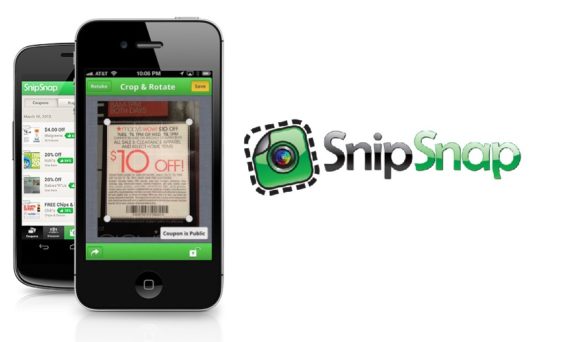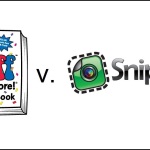The SnipSnap coupon app has launched a vigorous defense of its business, calling a trademark infringement case against it “fatally flawed”. In its first public response to a lawsuit filed by the publishers of KidStuff coupon books, SnipSnap requests the denial of a proposed injunction that would force it to immediately stop making KidStuff coupons available on the app. Such an injunction would have far-reaching consequences, SnipSnap argues, saying it “would wreak havoc throughout the internet” and cause “the start-up hubs of our nation” to “fast dry-up.”
SnipSnap makes its argument in court papers filed in response to KidStuff’s injunction request. As first reported on Coupons in the News, KidStuff filed a lawsuit last month, accusing SnipSnap of allowing its coupons to be uploaded and shared on the app, in violation of the coupons’ terms.
By way of background, KidStuff publishes coupon books that are sold as school fundraisers. SnipSnap is a mobile app that allows users to take a picture of a paper coupon and upload it to the app. SnipSnap then purports to turn the photo into a mobile coupon that can be used in place of the paper coupon. SnipSnap says manufacturer’s coupons are not supported, but store coupons are.
Many retailers, however, would beg to differ. Several have asserted that attempting to redeem a digital photograph of a coupon violates the coupon’s terms against reproduction, and interferes with their accounting, which requires that they retain physical copies of all coupons redeemed. A number of retailers have requested that SnipSnap no longer allow their coupons to be made available on the app. With varying degrees of success, SnipSnap has attempted to comply.
But in its lawsuit, KidStuff argues that SnipSnap’s attempt to remove its coupons from the app was “wholly inadequate”. Therefore, it chose to sue – and to request an injunction that would compel SnipSnap to immediately prevent any and all KidStuff coupons from appearing on the app, pending the lawsuit’s outcome.
SnipSnap says such a request is baseless.
As CEO Ted Mann indicated to Coupons in the News back in June, SnipSnap claims protection from precisely this kind of legal claim, under the Digital Millennium Copyright Act. Calling itself “a service provider that respects the rights of copyright holders,” SnipSnap’s defense asserts that “the DMCA was designed to protect online entities such as SnipSnap who would not be able to survive if they were exposed to liability for every claim of copyright infringement arising from material shared by third parties.”
The DMCA protects websites like eBay and YouTube from being held liable for any infringing activity on the part of their users. As long as the site remains a passive third party that merely hosts unscreened user-generated content, and has a procedure in place to remove any copyrighted material when a complaint is made, it can claim safe harbor protection from any accusations of copyright violation.
Plus, “the burden is on copyright holders, not the service providers, to review potential infringement,” SnipSnap argues, “and submit a DMCA-compliant notice to the service provider.” KidStuff, it claims, failed to do so. “KidStuff bypassed the DMCA altogether by filing suit without first providing SnipSnap with proper notice and an opportunity to take down the material under the DMCA.”
The DMCA does give wide latitude to service providers when it comes to hosting potentially infringing materials. If YouTube were to be sued every time a user posted a copyrighted video, it would likely cease to exist.
But the crux of KidStuff’s argument is that SnipSnap does not qualify for the DMCA’s safe harbor at all. Unlike YouTube or eBay, which would function just fine without the inclusion of any copyrighted materials, KidStuff argues that SnipSnap’s business depends on, and is built upon, the unauthorized reproduction of copyrighted material. SnipSnap’s “entire business model is based on the copying and widespread redistribution of coupons,” KidStuff’s injunction request reads, “the vast majority of which Defendant knows are not authorized for reproduction and redistribution by the coupon issuer.”
SnipSnap claims innocence – and ignorance – when it comes to KidStuff coupons. “There is no evidence that SnipSnap should have known that KidStuff’s coupons were made available by SnipSnap users,” it claims. “Even more, there is no evidence that SnipSnap knew such coupons were even on its system” prior to KidStuff’s complaint. “Allegations of willful blindness must pertain to specific acts of infringement and not mere general awareness,” SnipSnap goes on, pointing out that it did remove specific coupons that KidStuff complained about, but that it can’t be held responsible just because there might possibly be other copyrighted material available on the app.
That’s because SnipSnap users, not SnipSnap itself, are the ones who are ultimately responsible for what’s available on the app, SnipSnap says. “The Terms of Service prohibit, among other things, uploading and sharing coupons that infringe the intellectual property of third parties,” it notes.
Indeed, SnipSnap’s terms of service state that “it is expected that all users of any part of the App will comply with applicable copyright laws.” Futhermore, “by posting any content, you represent and warrant… that posting such content does not violate or constitute the infringement of any patent, copyright (or) trademark” and that “you have all right, title, and interest to such posted content.”
That would seemingly preclude virtually anyone but coupon issuers themselves from uploading coupons to the app. Anyone else does so at their peril, a point that KidStuff made when it included as defendants in its lawsuit, ten “John Does” – SnipSnap users it hopes to identify, who’ve uploaded KidStuff coupons to the app.
SnipSnap says it’s not responsible for what those “John Does”, or any of its users, might do. SnipSnap “simply does not control what its users choose to upload onto the SnipSnap app,” its argument reads. Therefore, “KidStuff’s trademark infringement argument against SnipSnap is fatally flawed since it is the user of the SnipSnap app who may have used the KidStuff coupons to create confusion, not SnipSnap.”
But KidStuff also accuses SnipSnap of being more than just a passive third party. Part of its argument is that SnipSnap is guilty of contributory infringement. SnipSnap actively participates in violating KidStuff’s copyrights, KidStuff claims, because it creates new mobile-optimized bar codes from the photos that users upload. Retailers aren’t presented with a crude photograph of a coupon – they see a nice clean bar code that looks like a retailer-issued mobile coupon, when it’s actually SnipSnap’s mobile version of a retailer-issued paper coupon.
SnipSnap pushes back against this accusation as well, saying that the bar code conversion is done “without any human intervention.” “The brief interaction with coupons that SnipSnap encounters is fleeting and limited to the viewability of the coupons,” it claims, comparing what it does to “the conversion (or transcoding) of videos into a standard display format” on a site like YouTube.
SnipSnap’s final argument against forcing it to comply with the proposed injunction – doing so would be really hard. “If this court were to grant the requested injunction, SnipSnap would be forced to comply with the highly burdensome and taxing requirement to remove every possible KidStuff coupon whenever they may be uploaded by a SnipSnap user,” it protests. “Consequently, SnipSnap, a lean start-up company with limited resources, would have to bear a vexing task that would make business as usual exceedingly more difficult.”
But that’s precisely KidStuff’s point. If “business as usual” for SnipSnap is violating, and allowing users to violate, KidStuff copyrights, the injunction would require them to take whatever measures necessary to stop. SnipSnap counters that it “cannot reasonably determine whether uploaded coupons are infringing short of implementing a rigorous monitoring and policing system, which it is not required to implement.”
Curiously, though, while claiming that compliance is impossible, SnipSnap simultaneously argues that it has already complied with KidStuff’s demands. In its response, SnipSnap explains that it obtained and closely examined KidStuff coupons, in order to glean “very valuable information” such as identifying marks and bar codes. As a result, “SnipSnap has a system of filters in place that will prevent any future use of KidStuff coupons; whenever a KidStuff barcode or logo is detected, the coupon will automatically be made unusable to the user.”
With no sense of irony whatsoever, SnipSnap described how it obtained the KidStuff coupons in order to examine them and program the app to disable them: “SnipSnap purchased four sample KidStuff coupon books on eBay.” Never mind that, in addition to stating that “reproducing KidStuff coupons in whole or in part is unlawful,” KidStuff coupons also state that “coupons may not be sold or bartered.”
In conclusion, SnipSnap contends, with just a hint of hyperbole, that “granting the requested injunction would turn the DMCA on its head and would wreak havoc throughout the internet… In addition, the litigation flood gates would be blasted open and wide, and service providers will be powerless and defenseless to the deluge of copyright and trademark infringement suits. The start-up hubs of our nation would fast dry-up.”
Ultimately, SnipSnap rejects KidStuff’s argument that its entire business model “depends on infringement.” “The sharing of coupons among users in which any infringing activity that may occur is the exception and under no circumstances is a part of SnipSnap’s business model,” SnipSnap contends. Any attempt to compare its business to others that have previously been held liable for user-generated content that infringed copyrights “cannot possibly pass the smell test.”
But that’s exactly what it smells like to KidStuff. In one of the cases that SnipSnap cites, and dismisses, the U.S. Supreme Court ruled that “one who distributes a device with the object of promoting its use to infringe copyright… is liable for the resulting acts of infringement by third parties using the device, regardless of the device’s lawful uses.”
SnipSnap says it does not encourage copyright violations. KidStuff says, by encouraging users to reproduce and share copyrighted coupons, it does just that. Whether SnipSnap prevails, or KidStuff succeeds in “wreak(ing) havoc throughout the internet”, is now for the court to decide.














